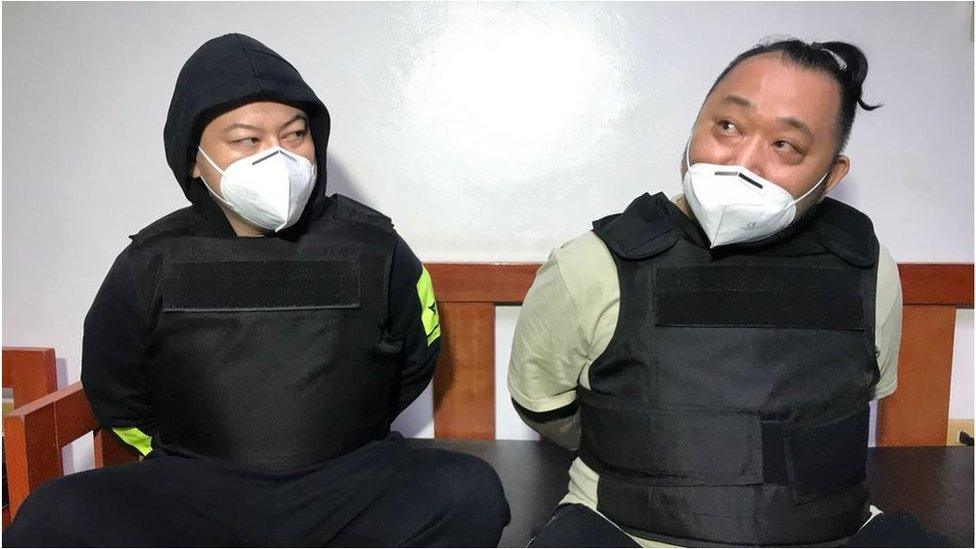'Luffy': Japan arrests 'crime bosses' who lived in Philippine jail
- Published

Yuki Watanabe (left) and Tomonobu Kojima (right) were deported from the Philippines to Japan on Wednesday
Japanese police have arrested four men for allegedly orchestrating scams and robberies while jailed overseas, in a case that has gripped the country.
Authorities say they targeted the elderly, and stole or cheated their victims of billions of yen.
From their jail in the Philippines, the men managed to recruit accomplices in Japan to carry out the robberies.
One of them is said to be the mastermind, who calls himself "Luffy" after a popular anime character.
Philippine authorities deported two of them, Kiyoto Imamura and Toshiya Fujita, to Japan earlier this week.
The other two - Yuki Watanabe and Tomonobu Kojima - arrived in Japan on Wednesday night.
They were among dozens of Japanese nationals who have been arrested in the Philippines since late 2019 on suspicion of involvement in scam crimes.
'A very twisted scenario'
Japanese authorities had been hunting down the gang since the wave of crimes first began in the summer of 2021.
More than 50 incidents spread across 14 prefectures are said to be linked to the gang, including one which resulted in the murder of a 90-year-old woman in Tokyo in January.
The four ringleaders were already held in a Philippine jail when they began their scheme, according to reports.
Using their mobile phones, they recruited for accomplices in Japan via social media, where they put up cryptic ads for "dark part-time jobs" promising lucrative pay. They would send instructions and communicate with their gang members via the encrypted app Telegram.
The accomplices would pose as members of the police or members of the Japan Financial Services Agency and tell victims that their accounts had been compromised, according to the Asahi Shimbun. During a subsequent visit to the victim's home, the accomplice would steal their ATM cards to withdraw all their money.
The main leader of the operation was only known as "Luffy", the name he used in Telegram and an apparent nod to the character Monkey D Luffy from the popular Japanese anime One Piece.
Some Japanese and Philippine media reports have identified Mr Watanabe as "Luffy", citing prison sources, but Philippine authorities have refused to confirm this.
Mr Watanabe's and Mr Kojima's deportation was delayed for days due to a domestic violence complaint filed by their Filipina partners, which was dismissed by a Manila court this week.
Philippine Justice Minister Jesus Crispin Remulla said the complaint was fabricated to prevent the two Japanese men's deportation and stall Japanese police. Under Philippine law, foreigners with pending charges cannot leave the country.
"There is no more escape for them," Mr Remulla told reporters. "It's a very twisted scenario we are looking at."
Philippine authorities confiscated 24 mobile phones from the suspects, which have been sent to Japanese authorities as evidence, he added.
The case has also underscored how detainees in Philippine jails are able to bypass security to command robbery, kidnapping and drug-dealing operations using their smartphones.
Before the "Luffy" case, past raids have found that inmates kept jacuzzi tubs, blow-up sex dolls, methamphetamines, high-powered guns, and a recording studio that allowed the ringleader of a kidnapping gang to record a music album and post music videos on YouTube.
Mr Remulla blamed the breach on corruption in the jail system, which he said would be addressed.
The suspects were deported in the same week of Philippine President Ferdinand Marcos Jr's official visit to Japan, where he is scheduled to meet with Prime Minister Fumio Kishida.
Mr Remulla said the Philippines wanted to show its willingness to cooperate with its neighbours in fighting transnational crime, even if Manila and Tokyo are not bound by an extradition treaty.
Related topics
- Published26 January 2023